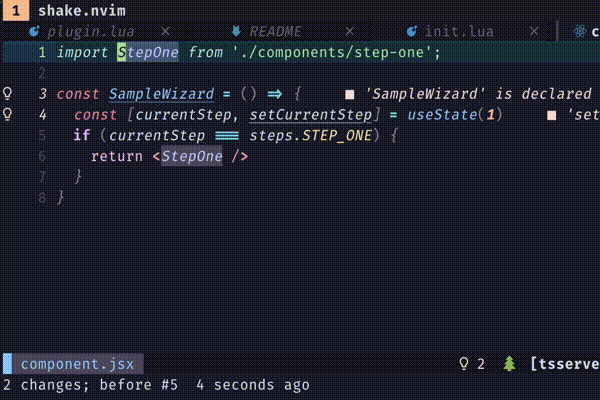An all in one plugin for converting text case in Neovim. It converts a piece of text to an indicated string case and also is capable of bulk replacing texts without changing cases
Converts text under cursor to another case. Only 3 keys to convert the current text.
Repeatable using .
Smartly guesses the current object using the following strategies:
- Tree Sitter (if available) [WIP]
- Word under cursor
- Ignore word separators
Converts definition under cursor to another case. Use Language Server Protocol to modify the definition, references and usages of the word under cursor
Repeatable using .
Converts given objects, it might require more key presses than the quick conversion but allows to control the specific target.
Repeatable using .
Supported targets:
- Vim objects: w, iw, aw, e, p, ...
- Selected text in visual mode
Converts all forms of a specific text, the replaced text will keep the original text case.
If not specified, it replaces every instance of the text in the current file; But it could be also scoped to the selected block:
It is also a library of text case conversion methods. Useful for your LUA code.
| Case | Example | Method |
|---|---|---|
| Upper case | LOREM IPSUM | textcase.api.to_constant_case |
| Lower case | lorem ipsum | textcase.api.to_lower_case |
| Snake case | lorem_ipsum | textcase.api.to_snake_case |
| Dash case | lorem-ipsum | textcase.api.to_dash_case |
| Title Dash case | Lorem-Ipsum | textcase.api.to_title_dash_case |
| Constant case | LOREM_IPSUM | textcase.api.to_constant_case |
| Dot case | lorem.ipsum | textcase.api.to_dot_case |
| Camel case | loremIpsum | textcase.api.to_camel_case |
| Pascal case | LoremIpsum | textcase.api.to_pascal_case |
| Title case | Lorem Ipsum | textcase.api.to_title_case |
| Path case | lorem/ipsum | textcase.api.to_path_case |
| Phrase case | Lorem ipsum | textcase.api.to_phrase_case |
Install with your favorite plugin manager. The setup function, sets up the default keybinding. To setup custom key maps, do not call require('textcase').setup{}, and follow the example bellow
Example in LUA using Packer.nvim. Default keybinding
use { "johmsalas/text-case.nvim",
config = function()
require('textcase').setup {}
end
}Example in VimScript using Plug. Custom keybinding
call plug#begin('~/.local/share/nvim/plugged')
Plug 'johmsalas/text-case.nvim'
call plug#end()
-- Example of custom keymapping
nnoremap gau :lua require('textcase').current_word('to_upper_case')<CR>
nnoremap gal :lua require('textcase').current_word('to_lower_case')<CR>
nnoremap gas :lua require('textcase').current_word('to_snake_case')<CR>
nnoremap gad :lua require('textcase').current_word('to_dash_case')<CR>
nnoremap gan :lua require('textcase').current_word('to_constant_case')<CR>
nnoremap gad :lua require('textcase').current_word('to_dot_case')<CR>
nnoremap gaa :lua require('textcase').current_word('to_phrase_case')<CR>
nnoremap gac :lua require('textcase').current_word('to_camel_case')<CR>
nnoremap gap :lua require('textcase').current_word('to_pascal_case')<CR>
nnoremap gat :lua require('textcase').current_word('to_title_case')<CR>
nnoremap gaf :lua require('textcase').current_word('to_path_case')<CR>
nnoremap gaU :lua require('textcase').lsp_rename('to_upper_case')<CR>
nnoremap gaL :lua require('textcase').lsp_rename('to_lower_case')<CR>
nnoremap gaS :lua require('textcase').lsp_rename('to_snake_case')<CR>
nnoremap gaD :lua require('textcase').lsp_rename('to_dash_case')<CR>
nnoremap gaN :lua require('textcase').lsp_rename('to_constant_case')<CR>
nnoremap gaD :lua require('textcase').lsp_rename('to_dot_case')<CR>
nnoremap gaA :lua require('textcase').lsp_rename('to_phrase_case')<CR>
nnoremap gaC :lua require('textcase').lsp_rename('to_camel_case')<CR>
nnoremap gaP :lua require('textcase').lsp_rename('to_pascal_case')<CR>
nnoremap gaT :lua require('textcase').lsp_rename('to_title_case')<CR>
nnoremap gaF :lua require('textcase').lsp_rename('to_path_case')<CR>
nnoremap geu :lua require('textcase').operator('to_upper_case')<CR>
nnoremap gel :lua require('textcase').operator('to_lower_case')<CR>
nnoremap ges :lua require('textcase').operator('to_snake_case')<CR>
nnoremap ged :lua require('textcase').operator('to_dash_case')<CR>
nnoremap gen :lua require('textcase').operator('to_constant_case')<CR>
nnoremap ged :lua require('textcase').operator('to_dot_case')<CR>
nnoremap gea :lua require('textcase').operator('to_phrase_case')<CR>
nnoremap gec :lua require('textcase').operator('to_camel_case')<CR>
nnoremap gep :lua require('textcase').operator('to_pascal_case')<CR>
nnoremap get :lua require('textcase').operator('to_title_case')<CR>
nnoremap gef :lua require('textcase').operator('to_path_case')<CR>To list conversion options using Telescope, register the extension in telescope and setup keybindings for normal and visual mode
config = function()
require('textcase').setup {}
require('telescope').load_extension('textcase')
vim.api.nvim_set_keymap('n', 'ga.', '<cmd>TextCaseOpenTelescope<CR>', { desc = "Telescope" })
vim.api.nvim_set_keymap('v', 'ga.', "<cmd>TextCaseOpenTelescope<CR>", { desc = "Telescope" })
endIn the example above, when using in normal mode, it shows options for quick and LSP conversion of the string. It is also possible to trigger a list of options only for Quick Conversion, or only for LSP conversion It only works for normal mode, because LSP does not make sense for visual mode
vim.api.nvim_set_keymap('n', 'gaa', "<cmd>TextCaseOpenTelescopeQuickChange<CR>", { desc = "Telescope Quick Change" })
vim.api.nvim_set_keymap('n', 'gai', "<cmd>TextCaseOpenTelescopeLSPChange<CR>", { desc = "Telescope LSP Change" })
If which-key is preset, text-case.nvim registers descriptions for the conversion groups
- Conversion based on LSP not working
A requirement for LSP rename to work is to have LSP set in the buffer and the Language Server should have the rename capability enabled.
To triage it, trigger LSP renaming using :lua vim.lsp.buf.rename() while the cursor is on the symbol. If it works, file an issue on this plugin

